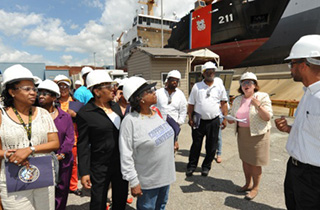Technical schools and institutes training workers for maritime and energy careers could get $12 million annually in new federal grant funding, under a bill introduced by a bipartisan trio of U.S. senators from coastal states.
The “Maritime and Energy Workforce Technical Training Enhancement Act” is sponsored by Sens. David Vitter, R-La., Tammy Baldwin, D-Wis., and Tim Kaine, D-Va., all from states with major maritime industries.
The legislation is the latest in responses to widespread industry concern with recruiting, training and retaining skilled workers, at a time when the average age in the present-day workforce is advancing through middle age.
According to Vitter’s office, the legislation will authorizes the U.S. Secretary of Energy to make grants between $1 million and $1.5 million to eligible colleges to expand maritime and energy workforce training programs.
Those efforts can include enrolling more students and training faculty, expanding facilities, creating maritime career pathways from associate to baccalaureate degrees, and awarding credit for prior learning experience. Schools could also seek grants to increase their cooperation with federal agencies.
The grants issued for three-year terms could be used for:
- Training related to maritime transportation, logistics, supply chain management, shipbuilding and ship repair
- Enhancement of workforce training, to include certifications and apprenticeships, for relevant maritime employment categories, such as tankerman, deckhand, and able-bodied seaman
- Salary supplementation for faculty in maritime training
- Operation of ship simulators, fire suppression equipment, marine fueling equipment, and measuring and sampling instruments
- Acquisition of maritime training equipment
- Renovation or construction of buildings used in maritime training (limited to 50% of any grant award)
- Tuition reimbursement for successful completion of a maritime course, program, or certification
In addition, the bill will allow grants up to $1.5 million for as many as 10 colleges in coastal states to establish “centers of excellence” in maritime and energy workforce training, to expand workforce training opportunities, and to assist with job placement. Grants would be prioritized toward colleges that have existing partnerships with federal agencies or other public or private partners.




